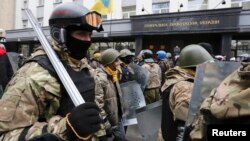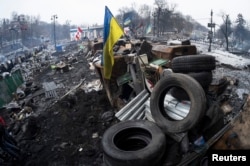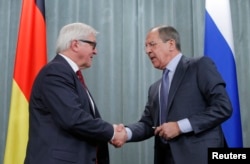Ukraine has freed the last of the 243 protesters arrested since anti-government demonstrations began in November.
The release was part of a law passed last month to free the demonstrators from police custody. But criminal charges will only be dropped when the demonstrators stop occupying government buildings.
Opposition activists say they will stop blocking a main road leading to public buildings in the capital, Kyiv. But they made no mention of when they would leave the the buildings.
President Viktor Yanukovich's government has fixed Monday as the deadline for all occupied municipal buildings to be cleared of protesters and barricades to be removed from city center roads in the capital Kyiv in exchange for the release of the detainees and a possible future pardon.
U.S. State Department spokeswoman Marie Harf calls the release of the protesters an important step to de-escalate tension in Ukraine and move towards a peaceful solution to the country's crisis.
Yanukovich negotiated the amnesty offer through parliament to try to take the sting out of street protests in Kyiv and elsewhere in Ukraine that have kept him on the back-foot since he spurned a trade pact with the European Union in November, in favor of closer ties to Russia.
Russian President Vladimir Putin has promised Ukraine a $15-billion aid package when a new government is in place, even if it is run by the opposition.
With much of downtown Kyiv a fortified camp where hundreds of "Euro-maidan" activists keep up protests behind barricades and sandbags, Yanukovich wants to tamp down tension before he picks a new prime minister, possibly as early as next week.
With protesters highly suspicious about virtually any offer from Yanukovich's side, however, there seemed little chance of them relinquishing control of the streets by next week, though they said late on Friday that they might allow traffic to pass on the main road leading to government headquarters.
General prosecutor Viktor Pshonka said on Friday authorities would immediately begin considering dropping charges if buildings were cleared and key roads in the capital re-opened by Monday. But opposition parties and radical protesters, who clashed violently with police last month, said they wanted all charges dropped immediately.
"We have people being released from jail but kept under house arrest, that is to say they are deprived of their rights, and there is a criminal case hanging over each one of them. This is not an amnesty. This does not meet the conditions of the opposition," Rostislav Pavlenko, a member of opposition leader Vitaly Klitschko's party, Udar (Punch), was quoted as saying by the Russian news agency Interfax.
At least six people have been killed in clashes with riot police - unprecedented in the 22 years since Ukraine gained independence - since thousands of protesters rebelled against Yanukovich's sudden move to snub the EU in favor of forging closer economic ties with former Soviet master Russia.
East-West rivalry
The crisis has triggered a geopolitical tussle between East and West: Russia is beckoning Yanukovich with a $15 billion aid package to plug holes in Ukraine's heavily-indebted economy while the United States and its Western allies have urged him to move back towards an IMF-backed deal with Europe.
The East-West rivalry flared anew on Friday when Russian Foreign Minister Sergei Lavrov, meeting Germany's Frank-Walter Steinmeier in Moscow, accused the EU of seeking to create a "sphere of influence" on its borders.
"Dragging Ukraine to one side, telling it that it needs to choose 'either or', either with the EU or with Russia, (the European Union) is in fact trying to create such a sphere of influence," Lavrov said.
There have been no street violence in Kyiv for three weeks.
But Western governments are worried about an escalation of conflict and breakdown of law and order unless Yanukovich meets opposition demands to allow them to form a government that could act independently of him.
They are also pressing him to change the constitution, under which his powers would be reduced and which would mean presidential elections before the scheduled date in March 2015.
A pivotal decision will be who Yanukovich names as his candidate for prime minister to replace the Russian-born Mykola Azarov, whom he sacked on Jan. 28 in a vain attempt to appease the protesters.
He has until the end of the month to reach a decision although parliament speaker Volodymyr Rybak was quoted by Interfax on Friday as saying he thought Yanukovich might present his choice to parliament next Tuesday.
With the hryvnia under devaluation pressure, he has to find a new steward of the economy quickly.
Some information for this story was provided by Reuters.
The release was part of a law passed last month to free the demonstrators from police custody. But criminal charges will only be dropped when the demonstrators stop occupying government buildings.
Opposition activists say they will stop blocking a main road leading to public buildings in the capital, Kyiv. But they made no mention of when they would leave the the buildings.
President Viktor Yanukovich's government has fixed Monday as the deadline for all occupied municipal buildings to be cleared of protesters and barricades to be removed from city center roads in the capital Kyiv in exchange for the release of the detainees and a possible future pardon.
U.S. State Department spokeswoman Marie Harf calls the release of the protesters an important step to de-escalate tension in Ukraine and move towards a peaceful solution to the country's crisis.
Yanukovich negotiated the amnesty offer through parliament to try to take the sting out of street protests in Kyiv and elsewhere in Ukraine that have kept him on the back-foot since he spurned a trade pact with the European Union in November, in favor of closer ties to Russia.
Russian President Vladimir Putin has promised Ukraine a $15-billion aid package when a new government is in place, even if it is run by the opposition.
With much of downtown Kyiv a fortified camp where hundreds of "Euro-maidan" activists keep up protests behind barricades and sandbags, Yanukovich wants to tamp down tension before he picks a new prime minister, possibly as early as next week.
With protesters highly suspicious about virtually any offer from Yanukovich's side, however, there seemed little chance of them relinquishing control of the streets by next week, though they said late on Friday that they might allow traffic to pass on the main road leading to government headquarters.
General prosecutor Viktor Pshonka said on Friday authorities would immediately begin considering dropping charges if buildings were cleared and key roads in the capital re-opened by Monday. But opposition parties and radical protesters, who clashed violently with police last month, said they wanted all charges dropped immediately.
"We have people being released from jail but kept under house arrest, that is to say they are deprived of their rights, and there is a criminal case hanging over each one of them. This is not an amnesty. This does not meet the conditions of the opposition," Rostislav Pavlenko, a member of opposition leader Vitaly Klitschko's party, Udar (Punch), was quoted as saying by the Russian news agency Interfax.
At least six people have been killed in clashes with riot police - unprecedented in the 22 years since Ukraine gained independence - since thousands of protesters rebelled against Yanukovich's sudden move to snub the EU in favor of forging closer economic ties with former Soviet master Russia.
East-West rivalry
The crisis has triggered a geopolitical tussle between East and West: Russia is beckoning Yanukovich with a $15 billion aid package to plug holes in Ukraine's heavily-indebted economy while the United States and its Western allies have urged him to move back towards an IMF-backed deal with Europe.
The East-West rivalry flared anew on Friday when Russian Foreign Minister Sergei Lavrov, meeting Germany's Frank-Walter Steinmeier in Moscow, accused the EU of seeking to create a "sphere of influence" on its borders.
"Dragging Ukraine to one side, telling it that it needs to choose 'either or', either with the EU or with Russia, (the European Union) is in fact trying to create such a sphere of influence," Lavrov said.
There have been no street violence in Kyiv for three weeks.
But Western governments are worried about an escalation of conflict and breakdown of law and order unless Yanukovich meets opposition demands to allow them to form a government that could act independently of him.
They are also pressing him to change the constitution, under which his powers would be reduced and which would mean presidential elections before the scheduled date in March 2015.
A pivotal decision will be who Yanukovich names as his candidate for prime minister to replace the Russian-born Mykola Azarov, whom he sacked on Jan. 28 in a vain attempt to appease the protesters.
He has until the end of the month to reach a decision although parliament speaker Volodymyr Rybak was quoted by Interfax on Friday as saying he thought Yanukovich might present his choice to parliament next Tuesday.
With the hryvnia under devaluation pressure, he has to find a new steward of the economy quickly.
Some information for this story was provided by Reuters.







